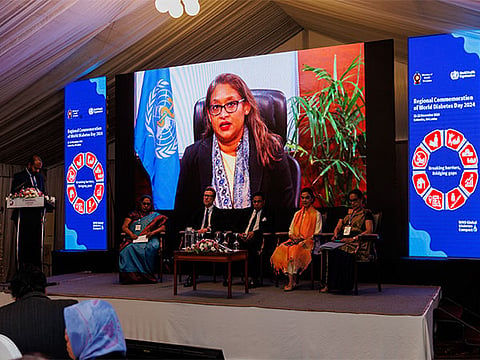

WHO Regional Director for South-East Asia, Saima Wazed, emphasizes that the theme for this year’s World Diabetes Day, Breaking Barriers, Bridging Gaps, reflects the urgent need for collective action to address the escalating diabetes burden across the Region. She highlights that individuals, communities, and health systems continue to face significant challenges in accessing effective diabetes prevention, early detection, and long-term management.
According to the latest 2022 estimates, nearly 246 million adults aged 30 years and above in the Region are living with diabetes. Without proper treatment and control, diabetes can lead to serious complications such as heart attacks, strokes, kidney failure, blindness, and amputations. These complications create emotional and economic strain on families and add substantial pressure on healthcare systems.
A major concern raised by Saima Wazed is that over 60% of people with diabetes remain undiagnosed. She stresses the need for widespread public awareness on prevention, screening, and management, integrating these messages with healthy lifestyle campaigns and programmes targeting maternal, child, and adolescent health.
Creating enabling environments to reduce diabetes risk factors is crucial. Countries in the Region have already made progress in areas such as tobacco control, obesity prevention, eliminating trans fats, and promoting physical activity—efforts now recognized as global best practices.
However, significant service gaps remain. Fewer than one in three adults with diabetes receive treatment, and only about 15% have controlled disease status. Strengthening primary healthcare systems with standard protocols, essential medicines, affordable diagnostics, and adequately trained staff is urgently needed.
The Region is moving forward, with more than 23 million people placed on protocol-based diabetes management by mid-2024, aligning with the SEAHEARTS target of managing 100 million individuals with diabetes and hypertension by 2025. Expanding primary healthcare integration, improving access to insulin and HbA1c testing, strengthening monitoring systems, and linking diabetes and tuberculosis services are key priorities outlined by the Regional Director.
Saima Wazed calls on governments, healthcare workers, and communities to work together to ensure equitable, affordable, and high-quality diabetes care so that no one is left behind.